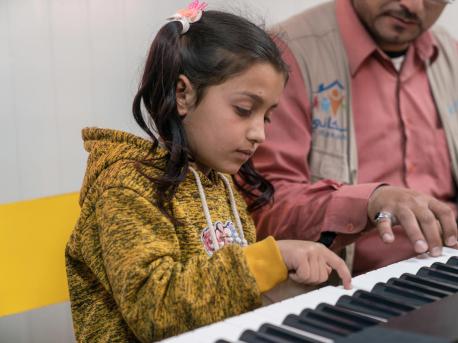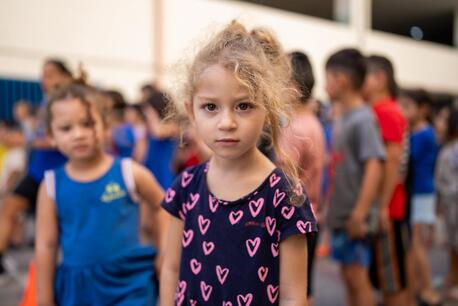
A New Music Therapy Program Is Helping Syrian Refugee Children Heal
There's a happy cacophony in the "Musiqati" class in Jordan's Azraq Refugee Camp. Syrian refugee children are playing a small orchestra of musical instruments all at once, and the effect is exhilarating. UNICEF's new musical therapy program is a big hit: "We do everything here. Like drum and piano," says 9-year-old Nour. "I like the xylophone. I feel happy."
My friends told me about this place," says 7-year-old Alaa. "I was told there is music, games and anything you want. I like it a lot because music is everything."
Seven years of brutal civil war has taken a staggering toll on Syrian children. UNICEF's "Musiqati" music therapy program, piloted in UNICEF Makani (My Space) centers, provides a safe space for children to be creative and to share their emotions through words, harmonies, rhythm and melodies. Children learn free expression and group communication through solos, duets, trios and groups. Learning musical communication techniques helps bring the children and their families together.
Facilitators, teachers and parents say they've already noticed a positive change in the children's behavior and emotional well-being since the pilot program began — including an improved ability to concentrate, greater self-confidence and taking greater responsibility for their actions at home and at school.
"When the children first come to my class, they are sad and holding many things inside," says Ahmed Al-Kateeb, a psychosocial support facilitator in the UNICEF Makani in Azraq. "When they release that, they become happy. I feel happy for them, boys and girls."
Please help Syrian refugee children driven from their homes by violence.
Top photo: Syrian refugee Nour, 9, plays piano in the 'Musiqati' class in Azraq Refugee Camp. UNICEF’s new musical therapy program is helping children to heal and teaching them how to express their feelings. © UNICEF/UN0206284/Herwig
HOW TO HELP
There are many ways to make a difference
War, famine, poverty, natural disasters — threats to the world's children keep coming. But UNICEF won't stop working to keep children healthy and safe.
UNICEF works in over 190 countries and territories — more places than any other children's organization. UNICEF has the world's largest humanitarian warehouse and, when disaster strikes, can get supplies almost anywhere within 72 hours. Constantly innovating, always advocating for a better world for children, UNICEF works to ensure that every child can grow up healthy, educated, protected and respected.
Would you like to help give all children the opportunity to reach their full potential? There are many ways to get involved.





